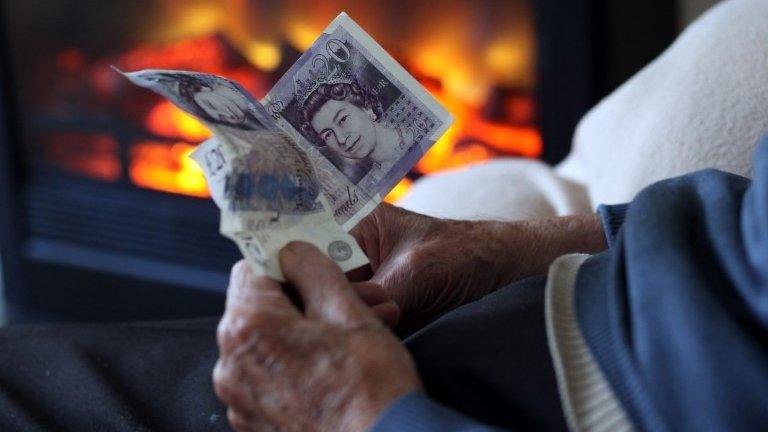Ofgem proposes reducing £5bn from household energy bills
- Published
- comments

Energy regulator Ofgem has proposed new rules to cut how much consumers spend on energy network investment
Ofgem has proposed new rules that it says would lead to UK consumers saving £5bn on energy bills over five years.
The regulator wants to cut how much consumers contribute towards energy network investment via their bills.
Ofgem says the the proposals will lead to £15-£25 in savings per year for household consumer.
The price controls will come into force in 2021 and significantly reduce the profits energy network companies receive.
National Grid, which runs Britain's main energy infrastructure, said it would continue to work with Ofgem "to achieve the best outcomes for all stakeholders".
The firm said it appreciated that Ofgem was taking into consideration key concerns for its business.
These considerations include the need to plan for long-term investment in critical infrastructure, as well as the need to ensure that both consumers and shareholders were kept happy.
Improving the grid
Energy network companies have invested £100bn into improving the national and local grids since 1990, and power cuts have almost halved since 2001.
Ofgem says that under existing price controls it has put in place, the cost of transporting a unit of electricity around Britain has fallen by 17% since the mid 1990s when calculated by the retail price index measure of inflation.
While investing in the energy network is important, the regulator said that network companies need to start consulting with consumers about their business plans, to ensure that they are in line with what consumers want and are willing to pay for.
Ofgem also said that energy network companies needed to make use of the latest technologies to ensure that the grids continue to run reliably, as well as supporting new technologies such as electric vehicles, electricity storage, and local renewable generation.
However, if energy network companies made savings due to using technological innovations to make their networks more efficient, then they needed to share those savings with consumers.
"Unjustified profits"
In July 2017, Citizens Advice released a report, external analysing all of the companies in the UK that transport gas and electricity. The report claimed that energy network companies had made £7.5bn in "unjustified" profits.
At the time, the Energy Networks Association (ENA) said it disagreed with the modelling used by Citizens Advice for its report.
Responding to Ofgem's latest initiative, Gillian Guy, chief executive at Citizens Advice said: "Today's announcement is a major step forward.
"These proposals should prevent a repeat of the billions in excess profits energy network companies are making under the current price controls. This means better value for consumers and potentially lower bills."
She added: "The outcome of this consultation will be the acid test for Ofgem. It's crucial that the regulator holds its nerve and sees through these changes.
"Curbing the ability of energy network companies to make excessive profits, limiting the price control to five years, and ensuring a greater voice for consumers are all measures that should take us closer to a towards an energy market that genuinely works for consumers."

Citizen's Advice has accused energy network companies of making £7.5bn in "unjustified" profits
In response to Ofgem's proposals, ENA's chief executive David Smith said that energy networks were at the heart of a "smarter, cleaner energy market", and that if the industry was expected to enable consumers to use new services like electrical vehicles, then the new price control regulations needed to be "balanced".
Mr Smith added that ENA was happy to set up consumer engagement groups to improve customer satisfaction.
"The energy sector is rapidly changing and consumers must be confident they continue to get good value for money for the services the networks deliver," said Jonathan Brearley, Ofgem's senior partner for networks.
"Ofgem's stable regulatory regime allows companies to attract investment from around the world on behalf of consumers in Great Britain at the lowest cost. We will capitalise on this by getting network companies to work harder to deliver better value for consumers in the next price controls."
- Published5 March 2018

- Published12 February 2018
